G-d’s presence alone passes through the sacrificial animals while Avram is in a deep sleep. As a result the covenant responsibility is entirely incumbent upon G-d. Therefore, it is impossible for Avram or his descendants (Israel) to revoke the covenant through disobedience. The land has been promised and will not be taken back. It is a perpetual promise from a G-d Who cannot lie and never breaks His oaths. Introduction: Those who consider the former chapter to be an outside source refuse to acknowledge any continuity with the present chapter. As a result the opening clause becomes irrelevant because it is not known to them which events precede it. A more realistic and logical view sees the obvious continuity between the two chapters and reads the opening clause as following the words spoken by Malki-tzedek, the king of S’dom and Avram at the conclusion of chapter 14. Remembering that the Torah sees no chapter division at all and therefore presumes continuity of chronology. I suggest rereading 14:18-24 and without breaking, continue to read the first verse of chapter 15. It will soon become obvious to you that these events are part of a continuing narrative. The text: Gen 15:1 After these words (D’varim, events) the Word (D’var) of HaShem (YHVH: Mercy) came unto Avram (father of a nation, exalted father) in a vision, saying, “Don’t Fear, Avram: I am a shield (magen) to you, a reward that is great exceedingly. Given that Malki-tzedek, the king of S’dom and Avram have just finished speaking, it seems more consistent to translate the Hebrew, “D’varim” literally as, “words”. Additionally, while it is popular to discredit translations that read the latter clause as an extension of Who G-d is to Avram, it is none the less a valid reading and makes more sense in light of the eternal nature of what follows. Therefore, I believe, “I am a shield (magen) to you, a reward that is great exceedingly” is the best reading. From this we understand that for the person of faith/trust, G-d is both protector and reward. Gen 15:2 And Avram said, Adonai HaShem/Elohim (Lord YHVH/G-D: Master, Merciful, Judge), what will You give me, seeing I go childless, and the heir of my household is from Damesek (Silent sackcloth weaver, mourning) Elietzer (My G-d helps)? Avram’s response, “My Lord HaShem Elohim” is an unusual combination of Divine titles. The Hebrew text reads, “Adonai YHVH” but the characters YHVH are marked with the nikudot (vowels) for Elohim—this is how the mistaken name Jehovah was concluded by early Christian translators. What the scribe intends, is that we understand the three attributes of G-d: Dominion, Mercy and Judgement. It is noteworthy that Avram calls G-d these titles prior to protesting his lack of progeny. Avram shows himself to be a man of relationship and true faith in that even his doubts place their trust in G-d. On reading the phrase, “My Lord G-d” the discerning Messianic Jew is reminded of another man of faith, who had at one time been a doubter: that is, T’oma (Thomas) the Talmid (disciple) of our Mashiyach Yeshua:
‘And after eight days again his disciples were inside, and Thomas was with them: then came Yeshua (Jesus), the doors being shut, and stood in the midst, and said, “Shalom Aleichem (Peace be unto you)”. Then He said to Thomas, “Reach out your finger, and touch my hands; and reach out your hand, and thrust it into my side: and don’t doubt, but believe. And Thomas answered and said unto Him, “My Lord and my G-d”.’ –Yochanan (John) 20:26-28 We now recall G-d’s promise to give Avram’s descendants all of the land of Israel (13:15): implicit in this promise is the provision of descendants. Avram knows G-d will fulfil His promise, so why does Avram respond the way he does? Avram’s response here is more of a, “How will You do it?” than it is a statement of mistrust. This is further testified to by the accreditation of righteousness that soon follows. When we ask G-d, “How will You keep Your promise?” we are not saying, “I don’t believe you can keep Your promise”. Trust or a lack thereof determines the way we respond to G-d. Gen 15:3 And Avram said, “Behold, to me You have given no seed: and, look, one born in my household is my heir. Male heirs were a necessity in the Middle Eastern culture of Avram’s time. In fact, this is still the case in many Middle Eastern countries today. A blood born heir was seen as a means to maintain the family name and heritage. For Avram this was more than a mere feeding of the ego, it was a means by which he might pass on his knowledge of the one true G-d. Thus the interchange over the issue of an heir was a G-d inspired conversation, filled with hope and purpose. Gen 15:4 And, behold, the Word of HaShem (YHVH) came unto him, saying, this shall not be your heir; but he that shall come forth out of your own loins shall be your heir. The Tanakh (OT) can speak of a legal heir as a son (Ruth 4:17), thus the emphatic phrasing, “out of your own loins”, literally: stomach, eternal organs. In order for this promise to be complete the heir must reach adulthood and be able to physically maintain the household and property belonging to Avram. Therefore, this is also a promise of longevity for Avram. Gen 15:5 And He brought him outside, and said, “Look now toward the heavens, and count the stars, if you’re able to number them: and He said unto him, so shall your seed be.” We now discover that the vision is seen at night. The phrase, “brought him outside” suggests that Avram was in his tent when the vision began. The subsequent events of verses 9-11 would probably have occurred the following day. The Midrash interprets, “outside” to refer to G-d showing Avram what is possible outside of humanity’s natural reasoning. Avram knew that it was now no longer physically possible for he and Sarai to have children, therefore, G-d was showing Himself to be the G-d of the impossible. The Jewish people would be born from miraculous events, thus miraculous events would pursue Israel all the days of her life in order to cause us to return to the G-d who birthed us. The Pesikta Zutresa explains that this vision symbolized to Avram that just as no nation could conquer the stars, so too no one would ever succeed in exterminating Israel. The stars 15:5 and the dust of 13:16 are symbolic representations of one and the same people. This is affirmed by the parallelism of 22:17. It is the ethnic people of Israel who are to inherit the covenanted land. This is made clear prior to Avram’s act of trust. Above all else we should note that G-d made this promise to Avram without condition. Gen 15:6 And he trusted in HaShem; and He counted it to him for righteousness. Avram had been trusting in HaShem for some time prior to this, therefore, the intended meaning here is that Avram gave himself over entirely in his trust of G-d: not just regarding the present promise but in all things. This verse is quoted twice by Rav Shaul (Paul) the Shaliach (Apostle): Romans 4:3 & Galatians 3:6, and by Yaakov in James 2:23. Both the present account and the argument posed by Shaul in Romans 4 show that faith/trust is not achieved but received. Our role in relating to G-d is the role of wife, receiving that which He has promised. Gen 15:7 And he said unto him, I am HaShem that brought you out of Ur (flame) of the Kasdim (Clay breakers), to give you this land to inherit it. This verse affirms that G-d has already established the land as Israel’s inheritance. Gen 15:8 And he said, “Adonai (Master) HaShem (YHVH: Merciful)/Elohim (Judge), in what will I know that I will possess it?” Avram uses the same unusual combination of Divine titles that he used in verse 2. This continues to show Avram’s submission to G-d’s Kingship, an understanding of His mercy and a respect for His judgement. Avram is not asking for visual affirmation because of doubt, he has just been named as one righteous through trust. Therefore, the question is a request for a physical connection within the conversation that he is having with the invisible G-d. G-d understands the human need for physical kinetic interaction and sees it as part of the vehicle of communication which strengthens relationship. Gen 15:9 And He said unto him, bring Me three heifers, and three she goats, and three rams, and a turtledove, and a young pigeon. From Avram’s perspective within time and space the animals are intended for the establishment of a covenant and to give it the status of an irrevocable oath. From G-d’s perspective the covenant is already established. By definition a covenant is irrevocable. Each of the animals listed are used for sin offerings in the Torah, for the purification and redemption of all Israel, from the greatest to the least, both corporately and individually.
The number three is representative of the unity of G-d, of perfection, completion and of an irrevocable decision, an established reality that has been firmly decided in the mind of G-d. Hence a perpetual application for the promises attached to the covenant. Avram didn’t divide the birds because birds are not divided for sacrificial purposes, as evidenced in the priestly offerings of Israel. Additionally, the dove/turtle dove is a symbol of Israel as the beloved of G-d (Shir Ha-shirim: Song of songs). As alluded to by Rabbi Solomon Yarchi who states that: “The idolatrous nations are compared in the Scriptures to bulls, rams, and goats; for it is written, Psalm 22:12: Many bulls have compassed me about. Daniel 8:20: The ram which thou hast seen is the king of Persia. The rough goat is the king of Greece. Daniel 8:21. But the Israelites are compared to doves, Song of songs: ‘O my dove, that art in the cleft of the rock.’ The division of the above carcasses denotes the division and extermination of the idolatrous nations; but the birds not being divided, shows that the Israelites are to abide for ever.” Ramban interprets the numbers of each animal to represent the three sorts of sacrifices, the burnt offering, the sin offering, and the peace offering; Ben Melech understands the three heifers refer to the heifer of the Day of Atonement, that for uncertain murder, and the red heifer. The common theme is one of atonement and redemption, which is to be associated with both the people of Israel and the land of Israel, and is based on G-d alone passing through the sacrificial animals by way of symbolic manifestation. It is noted that in regard to this type of ancient covenant, the one who walks between the sacrificed animals is bringing a death curse upon himself if the covenant is broken. Our Ram (Gen 22:13), Yeshua the Messiah, took upon himself the price of Israel’s salvation, the redemption of the land of Israel and by extension the price for the salvation of all humanity. Gen 15:10 And he took unto Him all these, and divided them in the midst, and laid each piece one opposite the other: but the birds he did not divide. For a similar sacrificial practice see Jeremiah 34:18. It was customary for both parties to pass through the divided animals. Here however, Avram simply sets the scene, while it is G-d whose presence passes between the divided animals. Gen 15:11 And when birds of prey came down upon the carcases, Avram drove them away. The birds of prey symbolize the nations that would seek to abrogate the covenant by destroying Israel, with the intention of taking the Promised Land for themselves. However, the King of Righteousness (Psalm 110), the Messiah, would one day be born, the seed of Avram and drive away the nations who seek to destroy His prize possession. Gen 15:12 And when the sun was going down, a deep sleep fell upon Avram; and, behold, a terror of great darkness fell upon him. The first mention of the L-rd putting someone into a deep sleep is found in Genesis 2:21 which records the creation of Chava (Eve) from Adam’s side. The relationship here seems to indicate that G-d is about to bring Israel (feminine) forth from Avram. Thus Avram is placed into a similar deep sleep. The same Hebrew word, “tardemah” is used in the account of 1 Samuel 26:12, where David (G-d’s anointed) walks among the army of Shaul while they are in a deep sleep sent upon them by G-d. It is also of great significance that Daniel the prophet saw his visions of the future while in a deep sleep (Daniel 8:18; 10:9). The dread and darkness are the appropriate atmosphere for conveying Israel’s coming years of slavery and darkness. This darkness is also prophetic of the darkness G-d would bring against Egypt (Exodus 10:21-22), which is called, “groping darkness”. This darkness is also related to Moses meeting with G-d on the mountain at Sinai. During this encounter, “Moses drew near into the thick darkness where G-d was” (Exodus 20:21-25). During this meeting G-d explains the means by which an altar for peace and covering are to be constructed. Thus there is a connection to Israel’s sacrificial system. Additionally, the terror and darkness are precursors to the appearance of the smoking pot and flaming torch, thus linking these events to the appearance of the L-rd at Sinai (Exodus 19). The New Covenant would also be inaugurated in darkness (Matthew 27:45, 51). In fact throughout Scripture G-d is seen as appearing in or coming down upon darkness (Deut 4:11; 5:22, 23; 2 Sam 22:10; 1 Kings 8:12; 2 Ch 6:1; Psalm 18:9, 1; 97:2). The Midrash sees the four elements of deep sleep, terror, darkness and falling as representing the progression of oppression that later came against Israel in the form of the nations: Babylon, Media-Persia, Greece and Rome. Gen 15:13 And he said unto Avram, “Know with certainty that your seed will be strangers in a land that is not theirs, and will serve them; and they will afflict them four hundred years; Gen 15:14 And also that nation, whom they will serve, I will judge: and afterward they will come out with great substance. The Rabbis calculate the beginning of the years of subjugation as being 30 years after this vision at the birth of Isaac, because Isaac lacked the permanence of territory and prestige that Avram enjoyed and his descendants were considered aliens even during their years in the land of Israel. Gen 15:15 And you will go to your fathers in peace; you will be buried in a good old age. Avram’s longevity and prosperity are affirmed yet again. The father of trust is entrusted with certain hope in HaShem. Gen 15:16 But in the fourth generation they shall come out again: for the iniquity of the Amorites is not yet full. The four generations and the four hundred years are synonymous, in that the Hebrew, “dor” is also understood to mean, “lifetime”. G-d is not only just but also patient. He will not drive out the Amorites at their present level of sinful behaviour, however, He knows that they will reach levels of sin and self-debasement that will require just discipline. Thus the later invasion of Joshua and the Israelites is not a usurping of land but an act of G-dly discipline, Israel being the instrument of that discipline. Gen 15:17 And it came to pass, that, when the sun went down, and it was dark, behold a smoking pot full of embers, and a burning torch passed between the pieces. The smoking pot and flaming torch are symbols of the Divine presence. These same symbols are seen leading Israel through the desert, a column of fire by night and a column of smoke by day (Exodus 13:21). This same manifestation of G-d’s presence was a protection for Israel when the column moved between Israel and the Egyptian army at the edge of the Red Sea (Exodus 14:20; Joshua 24:7). This protection reflects the promise G-d has made to be Avram’s shield. This same manifestation of the Divine presence is called the Angel of HaShem (Exodus 13:19). There is also a connection here to the revelation of G-d at Sinai (Exodus 19), Ezekiel’s vision (Ezekiel 1:13), and the pouring out of the Holy Spirit during Shavuot/Pentecost (Acts 2). It seems clear that due to the prophecy Avram has just received concerning Israel’s coming slavery, that the symbols of the Divine presence passing through the divided animals is a foreshadowing of the same Divine presence leading Israel through the waters of the Red sea. G-d’s presence alone passes through the sacrificial animals while Avram is in a deep sleep. As a result the covenant responsibility is entirely incumbent upon G-d. Therefore, it is impossible for Avram or his descendants (Israel) to revoke the covenant through disobedience. The land has been promised and will not be taken back. It is a perpetual promise from a G-d Who cannot lie and never breaks His oaths. This type of covenant is called an Unconditional Royal Covenant, as opposed to the conditional bargain-like covenant of Genesis 31:44. Gen 15:18 In the same day HaShem made a covenant with Avram, saying, “Unto your seed have I given this land, from the river of Mitzraim (Egypt: double destress) unto the great river, the river Perat (Euphrates: fruitfulness): Gen 15:19 The Ha-Kanee (Kenites: smiths), and the Ha-kenizee (Kenizzites: descendants of Kenaz: hunter), and the Ha-Kadmoneiy (Kadmonites: easterners), Gen 15:20 And the Ha-chetee (Hittites: descendants of chet: terror), and the Ha-Perizee (Perizzites: belonging to a village), and the Ha-Rephaim (Rephaimites: healing), Gen 15:21 And the Ha-Amori (Amorites: sayers), and the Ha-C’naanee (Canaanites: zealous), and theHa-Geergasheey (Girgashites: dwelling in clay soil), and the Ha-Y’vooseey (Jebusites: descendants of Y’boos: threshing floor).” “In the same day” means in the daylight hours following these events when Avram had awoken to hear the covenant promise, G-d spoke saying, “Unto your seed have I given this land, from the river of Egypt unto the great river, the river Euphrates”. Only during David’s reign were the boundaries of verse 18 attained, and then only as an empire. Of the ten nations (a number symbolizing completion), only the last seven were actually conquered by Joshua. The first three, The Kenites, Kenizzites, and the Kadmonites would belong to Edom, Moab and Ammon. The Rabbinical view is that these will be conquered and belong to Israel during the days of the Messiah (Isaiah 11:14). Given that G-d is bound by Himself to keep this covenant with Avram’s descendants, Israel, we can look forward to the time when the Messiah of Israel will return and reign over the entire Promised Land as King and High Priest over Israel and the nations. © 2016 Yaakov Brown HaShem has sworn and will not repent, “You are priest for (in) perpetuity (eternally) according to My words (d’varati: reasoning, cause, purposes) My king righteousness.” -Tehillim 110:4 Introduction and Overview:
At the conclusion of chapter 13 we find Avram camped beneath the oaks of Mamre (Strength, fatness, abundance) approximately 32 km south west of Beit-lechem (Bethlehem: House of bread). Avram had recently parted ways with his nephew Lot and had settled into his life rhythm, epitomized by the tent and altar, a sojourner in this world and one who understood the need for sacrifice. At least 15 years pass before Avram catches up with Lot again by way of delivering him from captivity. The present account is the first time in Biblical record that external history is co-ordinated with Biblical history. Scholars have concluded that the topographical details suggest these events took place in the early Bronze Age (The early second millennium BCE), subsequently some believe that chapter 14 was originally an outside account that was later added by Moses, however, there is equally compelling textual evidence to the contrary. Regardless, the tribal nations in question are well documented and archaeological evidence supports the Biblical account. Avram is seen exhibiting many of the characteristic qualities of a Tzadik (righteous one) throughout this chapter. He is living in the secular world but he is not of it. He understands his familial responsibility and rescues his nephew Lot from captivity. He remains fiercely vigilant in his calling, and while Lot’s green pastures have become short lived, Avram soon sees the L-rd’s providence at work in his right actions, even to the point of defeating a much larger combined force in the delivering of his nephew. This account begins with waring kings, sees Avram drawn into a secular war due to the captivity of his nephew Lot and then concludes with Avram being blessed by the King of Righteousness, which is closely followed by the king of S’dom’s attempt to compromise that blessing by offering to Avram that which wasn’t his to give. The Text: War of the Chieftains Gen 14:1 And it came to pass in the days of Amraphel (Speaks of darkness/Gives dark council) king (Chief) of Shinar (Country of two rivers), that Arioch (Fierce Lion) king of Elasar (G-d chastens/disciplines), Cedarlaomer (Hand full of sheaves) king of Elam (Pepetual/Eternal), and Tidal (Thanks toward High) king of nations (Goyim); Gen 14:2 Made war with Bera (In the evil) king of S’dom (Destruction, burning, field, demons), and with Birsha (In iniquity/guilt) king of Amorah (People of fear, bound, sheaves, submersed), Shinav (Teeth of father) king of Admah (Red Earth), and Shemeiver (Name that is strong) king of Tzeboiym (Beautiful ones), and the king of Bela (devouring, destruction, engulf), which is Tzoar (Insignificance). Gen 14:3 All these were joined together (bound in agreement) in the valley of Ha-Siddim (plain), which is Yam Ha-melach (the Sea of Salt—Dead Sea, a lake). Gen 14:4 Twelve years they served Cedarlaomer (Hand full of sheaves), and in the thirteenth year they rebelled. Gen 14:5 And in the fourteenth year came Cedarlaomer (Hand full of sheaves), and the kings that were with him, and smote the Rephaims (healing) in Ashterot (Cohesiveness/star goddess) Karnaim (Two horns), and the Zuzim (roaming ones) in Ham (hot), and the Emim (dreaded ones) in Shaveh Kiriathaim (Plain of two cities), Gen 14:6 And the Ha-Chori (cave dwellers) in their mount Seir (Hairy), unto Elparan (ram of glory: ayil – pa’ar), which is by the wilderness. Gen 14:7 And they returned, and came to Ein-mishpat (Spring of judgement), which is Kadesh (holy), and struck all the fields of the Amaleki (lapping people, wrung out people), and also the Amori (Sayers), that dwelt in Chatzetzon tamar (Division of a date palm). Gen 14:8 And there went out the king of S’dom (Destruction, burning, field, demons), and the king of Amorah (People of fear, bound, sheaves, submersed), and the king of Admah (Red Earth), and the king of Tzeboiym (Beautiful ones), and the king of Bela (devouring, destruction, engulf) [the same is Tzoar (Insignificance);] and they joined battle with them in the valley of Siddim (Plain); Gen 14:9 They fought against Cedarlaomer (Hand full of sheaves) the king of Elam (Perpetual, Eternal), and with Tidal (Thanks toward High) king of nations (Goyim), and Amraphel (Speaks of darkness/Gives dark council) king (Chief) of Shinar (Country of two rivers), Arioch (Fierce Lion) king of Elasar (G-d hastens/disciplines); four kings against five. Gen 14:10 And the valley of Siddim (Plain) had one tar piy after another (Be’erot be’erot); and the kings of S’dom (Destruction, burning, field, demons) and Amorah (People of fear, bound, sheaves, submersed) fled, and fell there; and they that remained fled to the hill country. Gen 14:11 And they took all the goods of S’dom (Destruction, burning, field, demons) and Amorah (People of fear, bound, sheaves, submersed), and all their food supplies, and went their way. Gen 14:12 And they took Lot (Covering), Avram's (Exalted father, Father of a nation) brother's son, who dwelt in S’dom (Destruction, burning, field, demons), and his goods, and departed. The names of the numerous kings illuminate the text greatly. I have rendered an allegorical paraphrase following the main text in order to try and convey a sense of the spiritual forces at work within the tribal nations and their attempts to gain supremacy over the other nations of the region. Something that can still be observed today in the conflicts of the Middle East. It’s worth noting that only the last of the five rebel cities survives the events of chapter 19. It appears that the valley of Siddim was submerged following the destruction of S’dom and Amorah. The Sea of Salt (Dead Sea) region was known in Roman times as Ashphalties, due to the lumps of bitumen often found floating in the waters, particularly in the southern waters which then covered the proposed location of the valley of Siddim. Avram Rescues Lot Gen 14:13 And there came one that had escaped, and told Avram (Exalted father, Father of a nation) the Hebrew (Ha-Ivri); for he dwelt in the plain of Mamre (Strength, fatness) the Amori (Sayer), brother of Eshcol (cluster, community), and brother of Aner (boy): and these were masters in covenant with Avram (Exalted father, Father of a nation). Gen 14:14 And when Avram heard that his brother was taken captive, he armed his trained servants, born in his own house, three hundred and eighteen, and pursued them unto Dan (Judge). Gen 14:15 And he divided himself against them, he and his servants, by night, and smote them, and pursued them unto Chovah (Hiding Place), which is on the left hand of Damasek (Silent sackcloth weaver, mourning). Gen 14:16 And he brought back all the goods, and also brought again his brother (nephew) Lot (Covering), and his goods, and the women also, and the people. Gen 14:17 And the king of S’dom (Destruction, burning, field, demons) went out to meet him after his return from the slaughter of Cedarlaomer (Hand full of sheaves), and of the kings that were with him, at the valley of Shaveh (Level plain, agreement), which is the valley of the king. The designation, Avram Ha-Ivri (Abram the Hebrew) is of great significance. The name Ivri is probably derived from the root Ever (an ancestor of Avram: Luke 3:35), which is variously translated, The Region Beyond, One From Beyond, From The Other Side; and He Who Passed Over: all of which allude to the coming Messiah of the Ivrim (Hebrews). In modern terms we could translate the text dynamically and say, “Abraham the Jew”. The Talmud interprets the 318 trained servants as being a symbolic representation of Elietzer (Eliezer) the servant of Avram, because the numerical value of the Hebrew name Elietzer is 318. While this is not the plain (p’shat) meaning of the text it is a beautiful picture of the present help of G-d in Avram’s battle to free his nephew: Eli (My G-d) etzer (Helps). The mention of the region of Dan is one piece of textual evidence that might suggest that this text was an oral or outside historical tradition that was added to the Torah at its recording by Moses at a later date. This may also explain the reference to the Salt Sea (Dead Sea) which some understand to have resulted from the destruction of S’dom and Amorah. Avram Encounters Malki-tzedek Gen 14:18 And Melki-tzedek (My king of Righteousness) king of Shalem (Peace, wholeness, soundness) brought forth bread (Lechem) and wine (Yine): and he is priest of the El elyon (G-d over all gods). Gen 14:19 And he blessed him, and said, Blessed be Avram (Exalted father, Father of a nation) of the El elyon (G-d over all gods), possessor of heaven and earth: Gen 14:20 And blessed be the El elyon (G-d over all gods), who has delivered your enemies into your hand. And he gave him a tenth of everything. It is here that we first see the unification of the roles of King and priest. King David, who inherited Melki-tzedek’s throne in Jerusalem would later write the 110th Psalm, which speaks of the King Messiah of Israel who was to come. Yeshua is thus confirmed in the book of Hebrews as the One of Whom David spoke, the king of Shalem being a type for Yeshua the Messiah, our King of Righteousness. Numerous Jewish scholars have misunderstood the text of verse 14:20, and have interpreted Melki-tzedek to be the giver of the tenth. This is easily refuted by the written record of the book of Hebrews, codified over 130 years prior to the earliest of the rabbinical opinions to the contrary. Not only can the Hebrew text be understood to mean that Avram gave a tenth to Malki-tzedek, the context also infers that this is the case. When we add to this the fact that the Torah presents the role of priest as a receiver of tithes and offerings on behalf of G-d, without exception, and that the drash of Hebrews 7 clearly articulates the fact that Avram was the giver of the tenth, the alternate reading becomes untenable. The best commentary on Genesis 14:18-20 is found in Psalm 110 and the book of Hebrews chapter 7. King David is the writer of the former and a Hebrew priest the writer of the latter. Both writers understood the greater priesthood of the Messiah Yeshua and the subordinate role that the Levitical priesthood plays in relationship to Him. It is interesting to note that Malki-tzedek blesses El-Elyon in verse 20. No man can bless G-d, because all things come from G-d and are returned to Him. This is therefore another allusion to the Messiah, Who is G-d with us and is thus qualified to bless G-d. 1 Of David, a musical oracle. HaShem said to my Lord (l’Adoni), Sit you at my right hand, until I make your enemies your footstool. 2 A branch of strength will be sent by HaShem out of Zion: to tread down your enemy. 3 Your people shall be spontaneously willing in the day of your power, in the beauties of holiness from the womb of the dawn: you will have the covering dew of your youth. 4 HaShem has sworn and will not repent, “You are priest for (in) perpetuity (eternally) according to My words (d’varati: reasoning, cause, purposes) My king righteousness.” 5 My Lord your right hand shall smash in the day of your snorting anger against kings. 6 Judging among the nations, he shall fill the places with dead bodies; he shall strike the heads of land abundant. 7 The stream in the way he will drink: therefore upright he will raise the head. –Tehillim [Psalm] 110 7:1 For this Melki-tzedek, king of Shalem, priest of El elyon, the most high God, who met Avram returning from the slaughter of the kings, and blessed him; Heb 7:2 To whom also Avram gave a tenth part of all; first being by interpretation King of righteousness, and after that also King of Shalem, which is, King of peace; Heb 7:3 Without father, without mother, without descent, having neither beginning of days, nor end of life; but made like unto the Son of God; remains a priest continually. Heb 7:4 Now consider how great this man was, unto whom even the patriarch Avraham gave the tenth of the spoils. Heb 7:5 And truly they that are of the sons of Levi, who receive the office of the priesthood, have an instruction to take tithes of the people according to the Torah, that is, of their fellow Israelites, though they come out of the loins of Avraham: Heb 7:6 But he whose descent is not counted from them received tithes of Avraham, and blessed him that had the promises. Heb 7:7 And without all contradiction the lesser is blessed of the better. Heb 7:8 And here men that die receive tithes; but there he received them, of whom it is witnessed that he lives. Heb 7:9 And as I may so say, Levi also, who received tithes, payed tithes in Avraham. Heb 7:10 For he was yet in the loins of his father, when Melki-tzedek met him. Heb 7:11 If therefore perfection were by the Levitical priesthood, (for under it the people received the Torah,) what further need was there that another priest should rise after the order of Melki-tzedek, and not be called after the order of Aaron? Heb 7:12 For if the priesthood is being changed, it is also necessity a change the instruction. Heb 7:13 For he of whom these things are spoken is of another tribe, of which no man gave attendance at the altar. Heb 7:14 For it is evident that our Lord (Yeshua) sprang out of yehudah (Praise); of which tribe Moses spoke nothing concerning priesthood. Heb 7:15 And it is yet far more evident: for that after the likeness of Melki-tzedek there arises another priest, Heb 7:16 Who is made, not after the Torah of an earthly carnal (fallen human) instruction, but by the power of endless life (Ein Sof – without end, a name for G-d). Heb 7:17 For he testifies saying, “You are a priest for ever after the order of Melki-tzedek. Heb 7:18 For there is truly a disannulling of the former instruction because of its weakness and inability to profit those instructed. Heb 7:19 For the Torah made nothing perfect, but the bringing in of a better hope did; by which we draw near to God. Heb 7:20 And this is affirmed by the fact that He was made priest with an oath: Heb 7:21 (For those priests were made without an oath; but this one with an oath by him that said unto him, “HaShem has sworn and will not repent, You are a priest for ever after the order of Melki-tzedek:) Heb 7:22 By so much was Yeshua (Jesus) made a guarantee of a better covenant. Heb 7:23 And there truly were many priests, they were not able to continue because each of them died: Heb 7:24 But this man, because he continues forever, has an unchangeable priesthood. Heb 7:25 Wherefore he is able also to save them to the uttermost that come unto God through Him, seeing He lives forever to make intercession for them. Heb 7:26 For such a Cohen Ha-Gadol (high priest) became ours, who is holy, innocent, undefiled, separate from sinners, and made higher than the heavens; Heb 7:27 Who need not daily, as those high priests, to offer up sacrifice, first for His own sins, and then for the people's: for this He did once, when He offered up Himself. Heb 7:28 For the Torah makes men high priests which have infirmity; but the Word [D’var (John 1): d’varati: see Psalm 110:4 (5)] of the oath, which was made after the Torah, affirms the Son, who is perfect for evermore. –Hebrews 7 The King of S’dom as Tempter Gen 14:21 And the king of S’dom (Destruction, burning, field, demons) said unto Avram (Exalted father, Father of a nation), Give me the persons, and take the goods for yourself. Gen 14:22 And Avram (Exalted father, Father of a nation) said to the king of S’dom (Destruction, burning, field, demons), I have lifted up mine hand (Made a pledge) unto HaShem (YHVH), the El elyon (G-d over all gods), the possessor of heaven and earth, Gen 14:23 That I will not take from you a thread even of a sandal thong, and that I will not take anything that is yours, lest you should say, “I have made rich Avram: Gen 14:24 Save only that which the young men have eaten, and the portion of the men which went with me, Aner (boy), Eshcol (cluster, community), and Mamre (Strength, fatness); let them take their portion. It is interesting to note the differences in the actions of the king of (Shalem) wholeness and peace, Malki-tzedek and the king of destruction, king of S’dom. Malki-tzedek (My king of righteousness) comes out to meet Avram with bread (Lechem) and wine, He offers Avram sustenance and then blesses him, asking nothing of him. To which Avram responds by giving a symbolic tenth of the spoils. The number 10 symbolizes completion and fulfilment in Hebraic thought, thus the King of Righteousness is seen as the one in whom Avram is made complete through trust. The king of S’dom on the other hand, comes to meet Avram and offers Avram that which is no longer his to give. The goods of S’dom are the spoils of war and rightfully belong to Avram, however, Avram refuses the offer—which is in fact an attempt to draw Avram’s eyes away from the promises of G-d with worldly riches. Avram is sure of G-d’s promises and his calling as the father of a holy nation, thus he asks nothing but that which belonged to those who had been in covenant with him. This is the first practical outworking of the promise of G-d, “I will bless those who bless you”. Some see the bread and wine as symbolic of communion (A Christian practice derived from Passover), and it is true that in Messianic Judaism we use the same blessing for both yeast filled bread and matzah (unleavened bread), however, the exodus hadn’t yet taken place, therefore there is no reason to commemorate pesach (Passover) here. It seems more likely that this is simply an offer of sustenance. Perhaps even an early Shabbat tradition, the King of Peace offering rest, respite and sustenance to a weary warrior. An Allegorical Paraphrase: using the meanings of the proper nouns (Remez) Gen 14:1 And it came to pass in the days of the one who gives dark council, chief of a country of two rivers, a fierce lion, chief of G-d’s discipline, and a hand full of sheaves, which ruled perpetually, gave thanks toward heaven in ruling the nations; Gen 14:2 They made war with the evil king of destruction and with iniquity the ruler over people in fear, their forefathers teeth were red with earth, a king of renown ruled beautiful ones, and the king devouring became insignificant. Gen 14:3 All these were in agreement with one another in the valley of the plain, which is the sea of salt. Gen 14:4 Twelve years they served one with a hand full of sheaves, and in the thirteenth year they rebelled. Gen 14:5 And in the fourteenth year came the one with a hand full of sheaves, and the kings that were with him, and smote the healers in the worship of the twin stars, and the roaming ones of heat, and the dreaded ones in the plain of two cities, Gen 14:6 And the cave dwellers in their hairy mountain, came unto the ram of glory, which was in the wilderness. Gen 14:7And they returned, and came to the spring of judgement, which is holy, and struck all the fields of the lapping people, and also the Sayers that dwelt in division under date palms. Gen 14:8 And there went out the king of destruction, and the ruler of people under fear, and the king of red earth, and the king of beautiful ones, and the king of devouring and Insignificance; and they joined battle with them in the plain valley; Gen 14:9 against the one with a hand full of sheaves the king of Eternity, and gave thanks toward heaven the king of nations, and one who gives dark council ruler of a country of two rivers, a fierce Lion king of G-d’s discipline; four kings against five. Gen 14:10 And the plain valley had springs, pits of tar; and the kings of Destruction and people of fear, fled, and fell there; and they that remained fled to the hill country. Gen 14:11 And they took all the goods of destruction, and the people of fear, and all their food supplies, and went their way. Gen 14:12 And they took covering, the nephew of the father of faith, who dwelt in Destruction, and his goods, and departed. Gen 14:13 And there came one that had escaped, and told the father of faith, Father of a nation, the Hebrew; for he dwelt in the plain of Strength, a Sayer, a brother in community, and brother of a young man: and these were masters in covenant with the father of faith. Gen 14:14 And when the father of faith heard that his nephew was taken captive, he armed his trained servants, born in his own house, three hundred and eighteen, and pursued them unto Judgement. Gen 14:15 And he divided himself against them, he and his servants, by night, and smote them, and pursued them into hidden places, where weakness silently wove sackcloth and mourned. Gen 14:16 And he brought back all the goods, and also brought again his nephew covering, and his goods, and the women also, and the people. Gen 14:17 And the king of Destruction, went out to meet him after his return from the slaughter of the one with a hand full of sheaves, and of the kings that were with him, at the valley of agreement, which is the valley of the king. Gen 14:18 And My king of Righteousness, king of Peace, wholeness, and soundness brought forth bread and wine: and he is priest of the G-d over all gods. Gen 14:19 And he blessed him, and said, Blessed be the father of faith, Father of a nation and servant of the G-d over all gods, possessor of heaven and earth: Gen 14:20 And blessed be the G-d over all gods, who has delivered your enemies into your hand. And he gave him a tenth of everything. Gen 14:21 And the king of destruction, said unto the father of faith, father of a nation, Give me the persons, and take the goods for yourself. Gen 14:22 And the father of faith, father of a nation said to the king of destruction, I have lifted up my hand and made a pledge unto HaShem, the G-d over all gods, the possessor of heaven and earth, Gen 14:23 That I will not take from you a thread even of a sandal thong, and that I will not take anything that is yours, lest you should say, “I have made the father of faith rich: Gen 14:24 Save only that which the young men have eaten, and the portion of the men which went with me, the boy, the community, and strength; let them take their portion. © 2016 Yaakov Brown The Sabbath is not incumbent upon the other nations, nor is it an obligation for the Christian Church (Acts 15:23-29). However, as a principle that teaches the need for humanity to rest in God, it should be applied to the lives of all believers (Mark 2:27). The Shabbat:
A sign between God and the people of Israel that teaches a principle of rest for all humanity. The instruction for ethnic Israel to keep the Shabbat, or Sabbath, is found in Exodus 31:12-16
Traditional Jewish observances begin with the lighting of two candles:
A woman (usually the Matriarch of the household or a young woman of bat mitzvah age [12]) lights the candles. This is because it was through a woman that sin [darkness] entered the world and it is through a woman that redemption [light] has entered the world.
The light of the candles symbolizes the light of God. For Messianic Jews this light reminds us of the fact that Yeshua [Jesus] is the light of the world (John 8:12). The candle lighter draws the light toward herself three times and then covers her eyes. The rabbis of Jewish tradition have many explanations for this. As Messianic Jews we see the unity of God represented in this practice as Father, Son and Holy Spirit. We understand that God is one (echad: a complex unity), and that He reveals Himself in many ways. We are inviting the light of Messiah Yeshua (Jesus) and at the same time we cover our eyes to acknowledge the Holiness of God. We welcome the Shabbat rest of God with traditional songs and prayers called Kabbalat Shabbat prayers. Kabbalah means to receive, we are receiving the rest of God, His rest is not something we can earn or achieve. In order to receive God’s rest we must acknowledge our inability to rest without Him. One of the most common songs sung is Lecha Dodi, which means, “Come beloved”. As Messianic Jews we see the unity of God’s rest and His Son our Prince of Peace in the invitation offered by the words of Lecha Dodi. Therefore we are inviting the Messiah Yeshua to bring us rest in God. Kiddush is the celebration of God’s provision for us. Kiddush means to sanctify, to set apart. Wine is used to represent the sanctifying life of God. Wine represents the life blood, during Passover the wine represents the life blood poured out as a sacrifice but during the Shabbat ceremony the wine represents the life blood as the means of our existence and vitality. Kiddush is lengthened by a recitation of the instruction to keep Shabbat. This reminds us of the Shabbat’s connection to God and His creation and causes us to look forward to the Olam Habah (World to come) and the eternal Shabbat rest of the New Jerusalem. Two Challot: The traditional bread used for the Shabbat is called Challah. The two loaves represent the double portion of manna given to Israel on the eve of the Shabbat when we wondered in the desert. For Messianic Jews these loaves also represent the Jew and the Gentile. When the Challah cover is lifted from the bread the light of the candles illuminates both loaves, making them echad (a complex unity). In this we see the light of Messiah’s redemption making the Jew and the Gentile echad (one) in Messiah. The Challah does not represent the body of Messiah. This is because the challah has yeast in it. In Biblical Judaism yeast is always seen as a symbol for sin. The body of Messiah is represented in the unleavened bread of the Passover meal which is celebrated once a year at approximately the same time as Easter. The Challah, like the Kiddush cup, is blessed and shared among those present. It is dipped in salt to remind us of the tears of Israel and the destruction of the temples. It is a reminder to Messianic Jews that the temple sacrificial system ended when the Romans destroyed the second temple in 70 AD. This seems appropriate to us given that the one sacrifice to cover all sin was made by Yeshua, the Lamb of G-d, once for all (Approx. 30AD). There is therefore no longer a need for the covering sacrifices of the temple sacrificial system. Blessing the Matriarch, the children and the community is an essential part of the Shabbat.
© 2016 Yaakov Brown "The foundation stone was called Shetiyah... because from it the world was created." -Babylonian Talmud © 2016 Yaakov Brown
|
Yaakov BrownFounder of the Beth Melekh International Messiah Following Jewish Community, Archives
February 2024
|
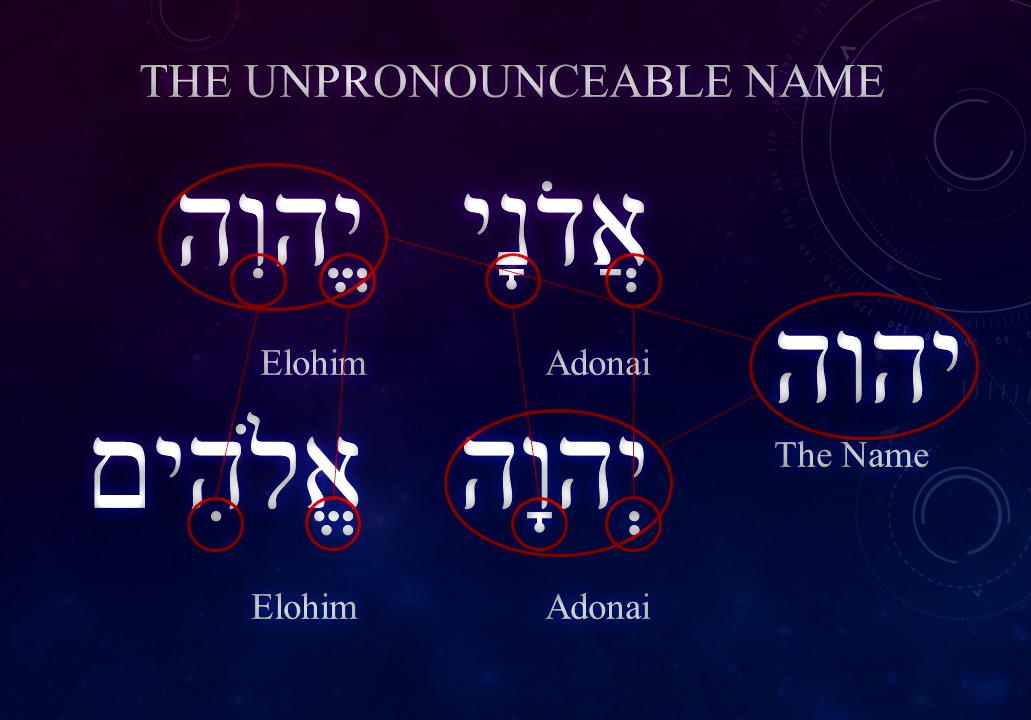
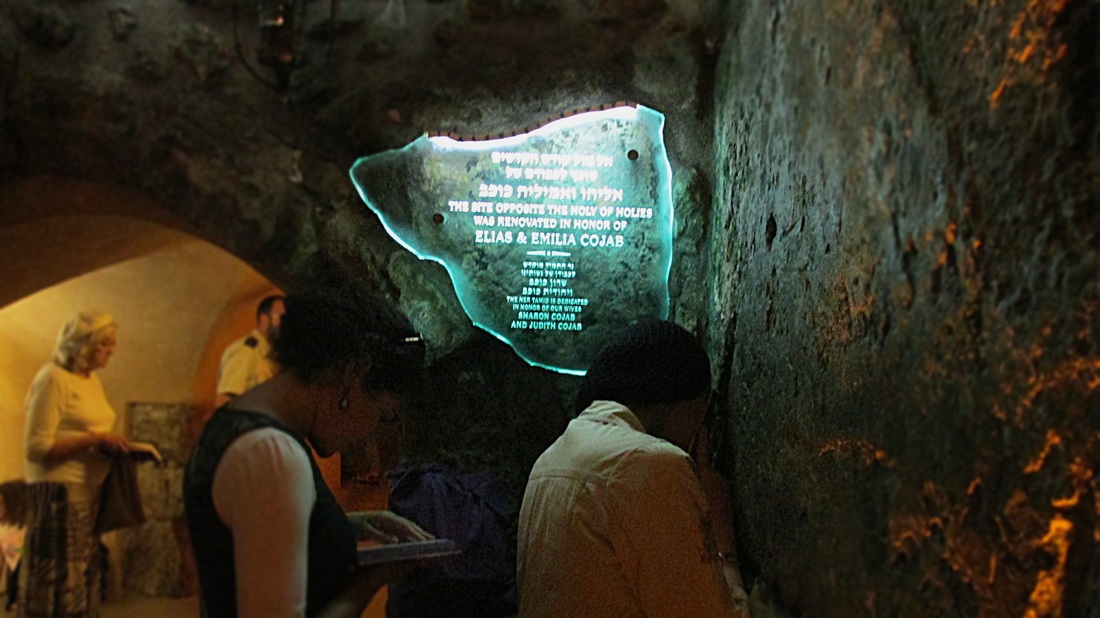
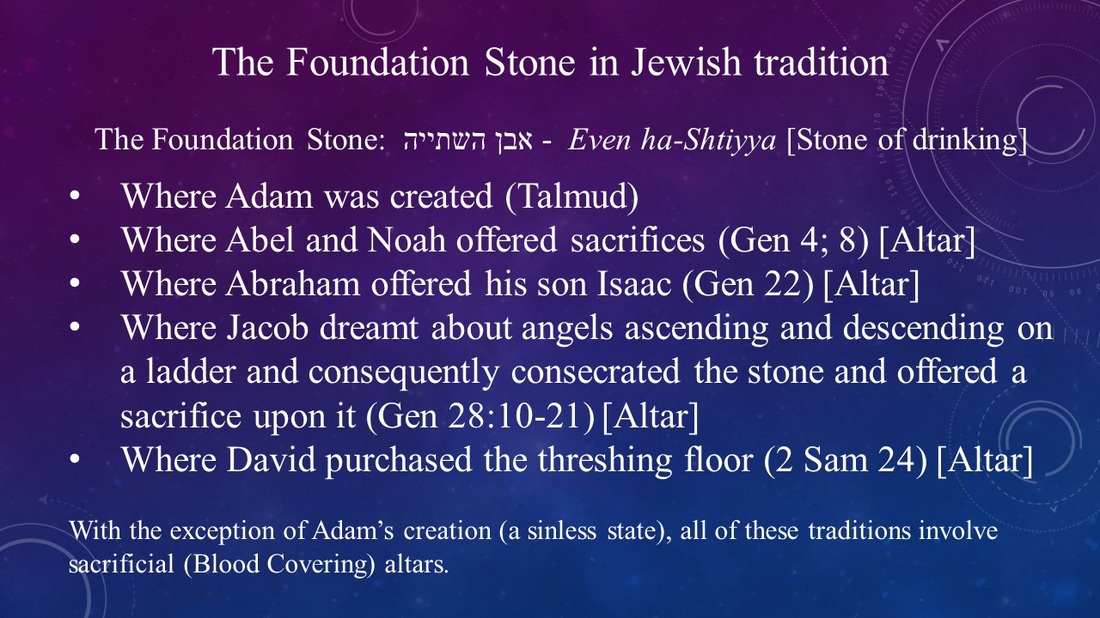
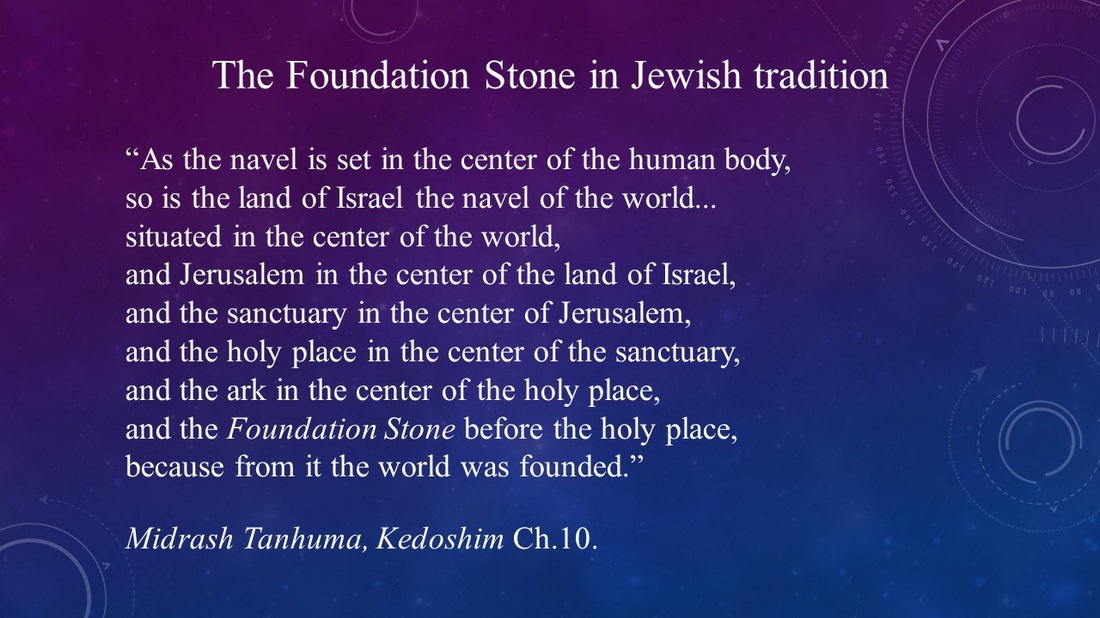
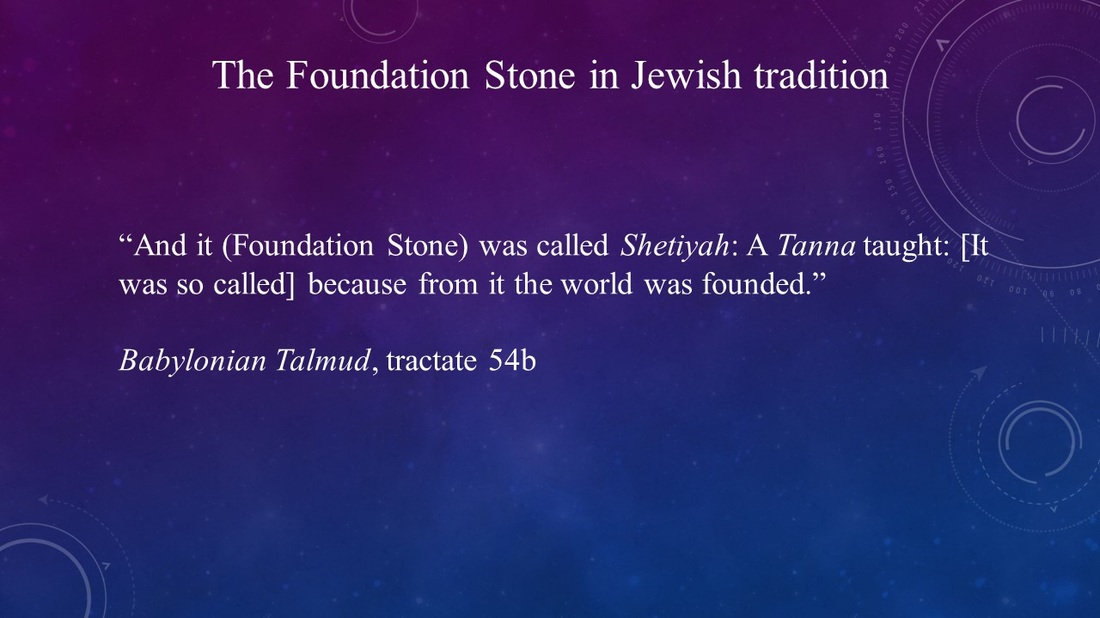
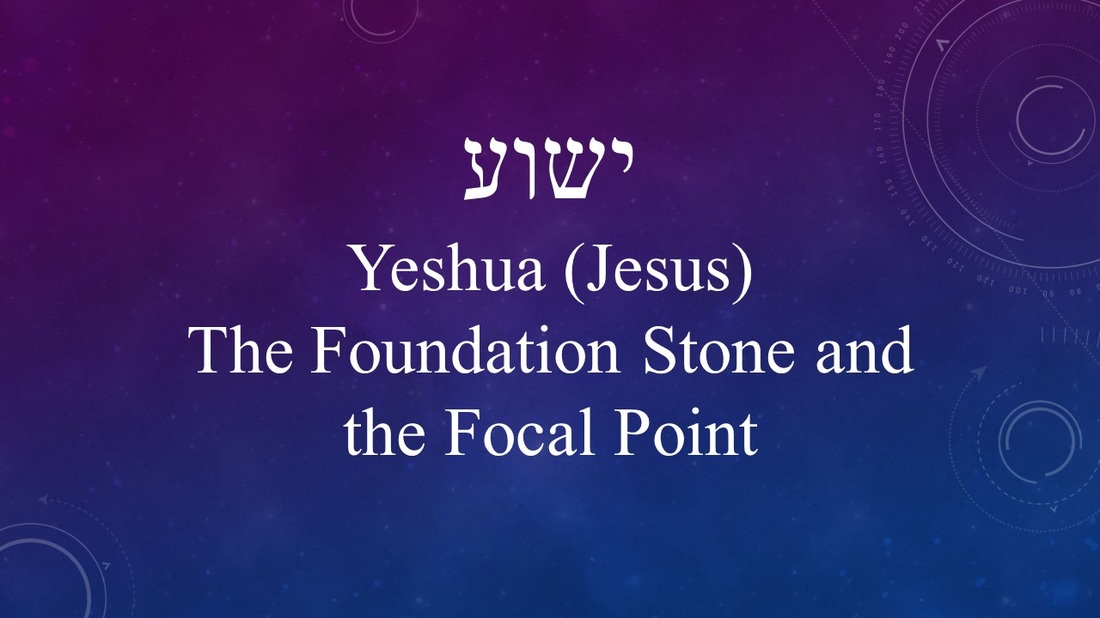
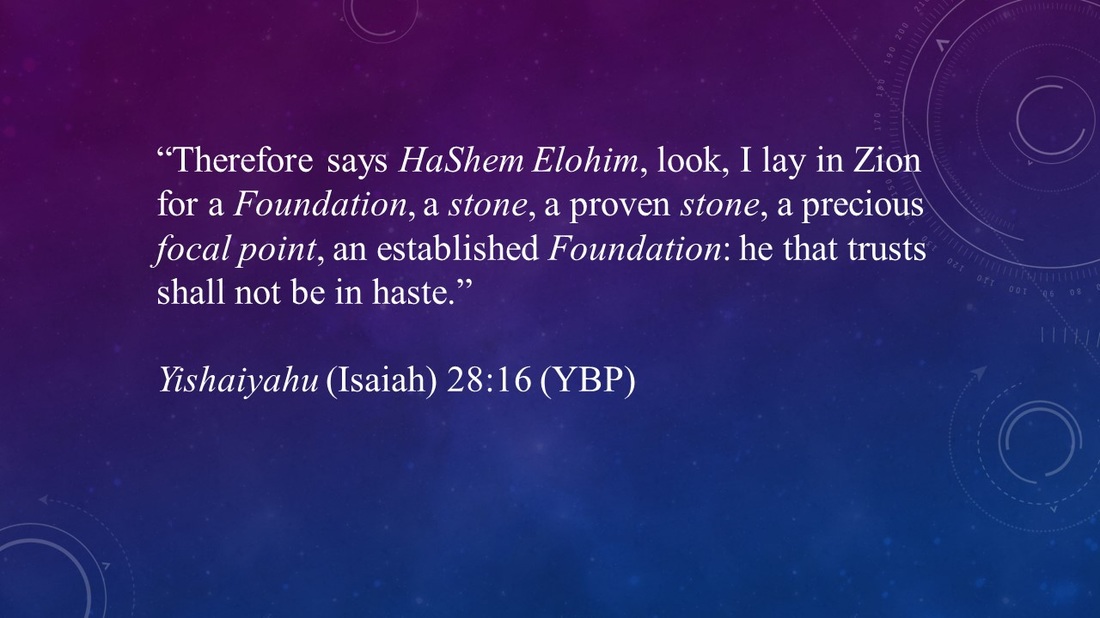
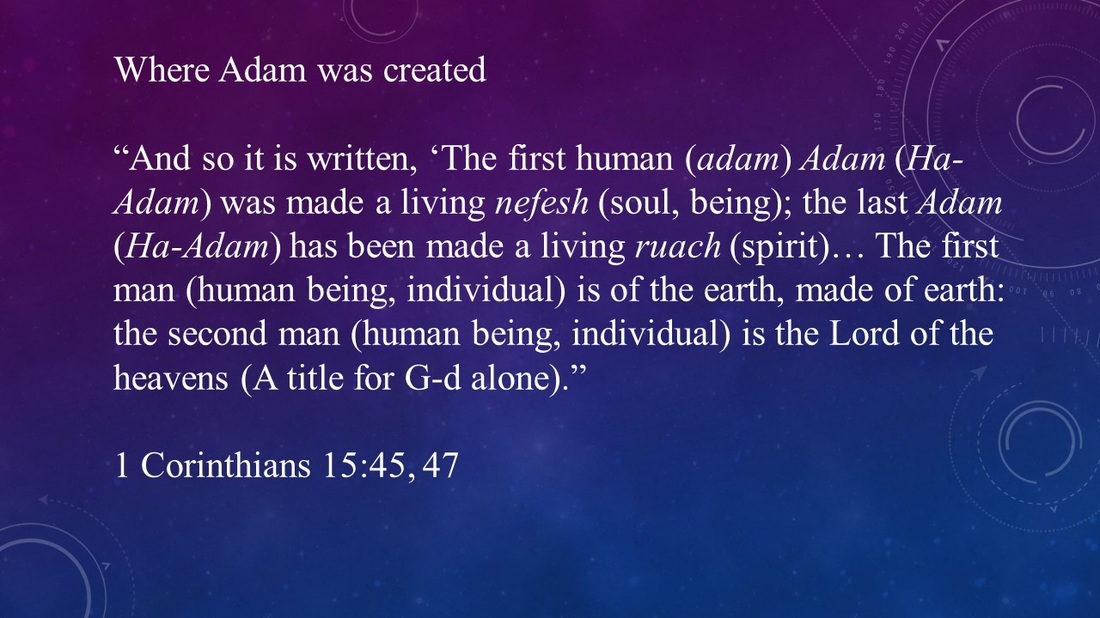
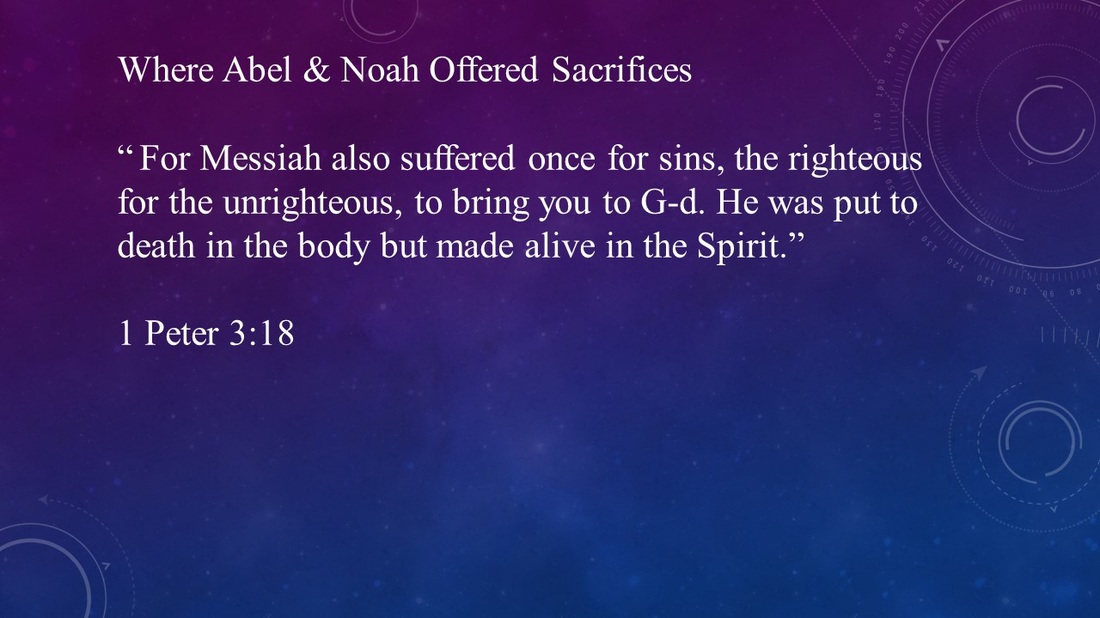
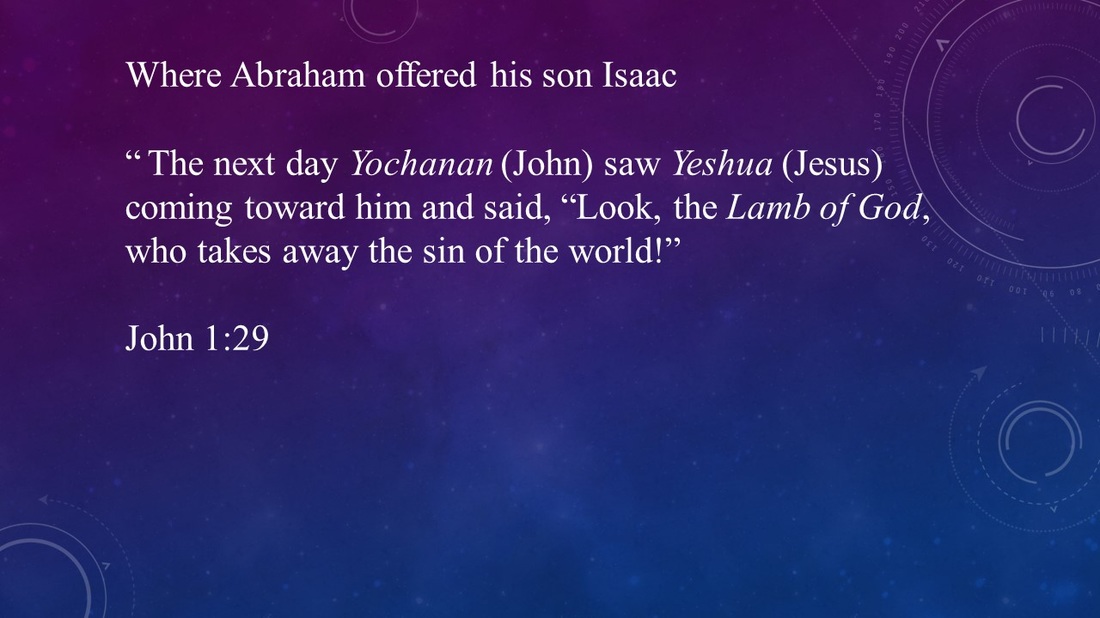
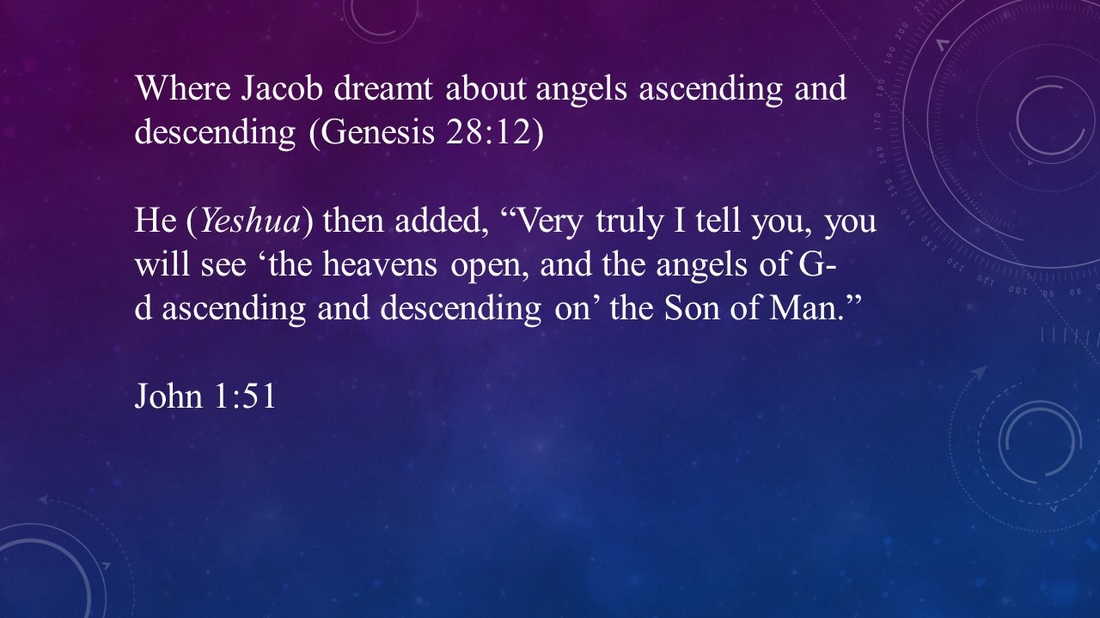
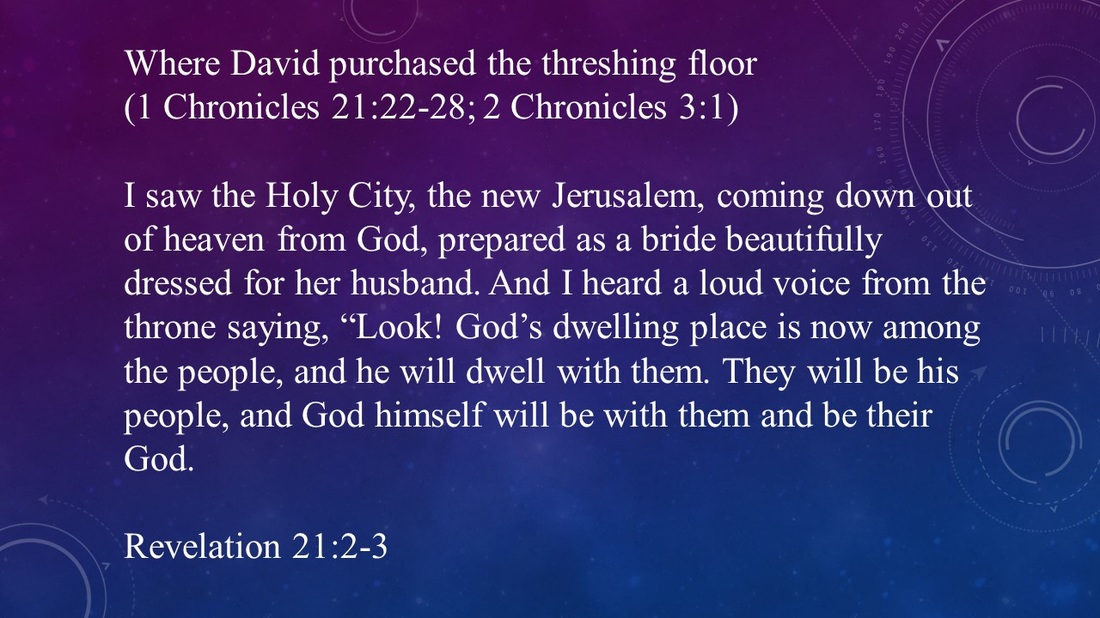
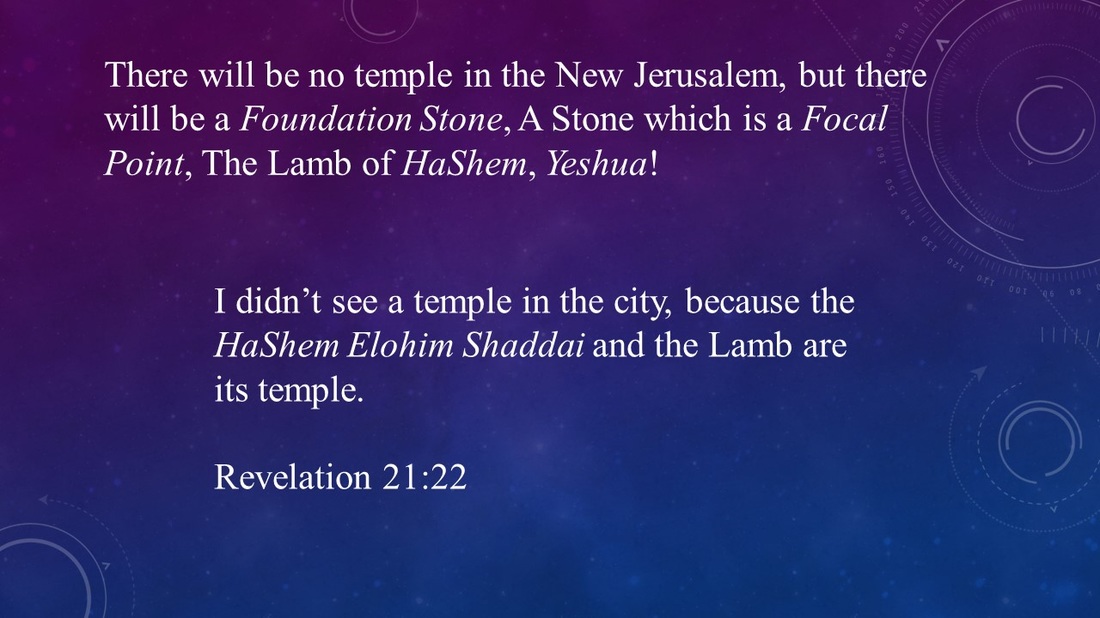
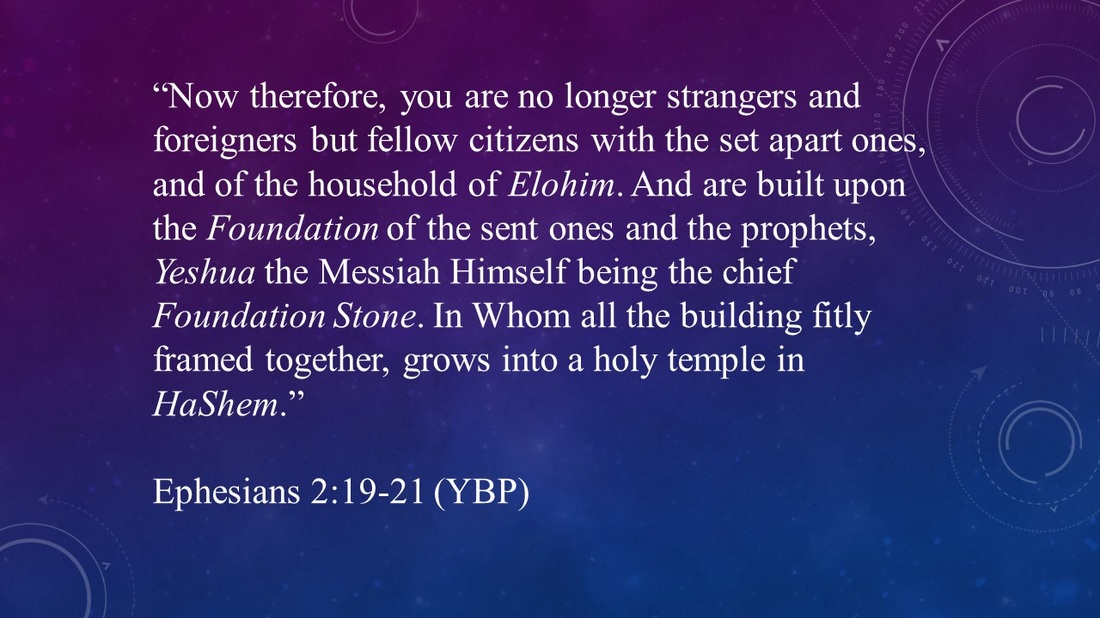
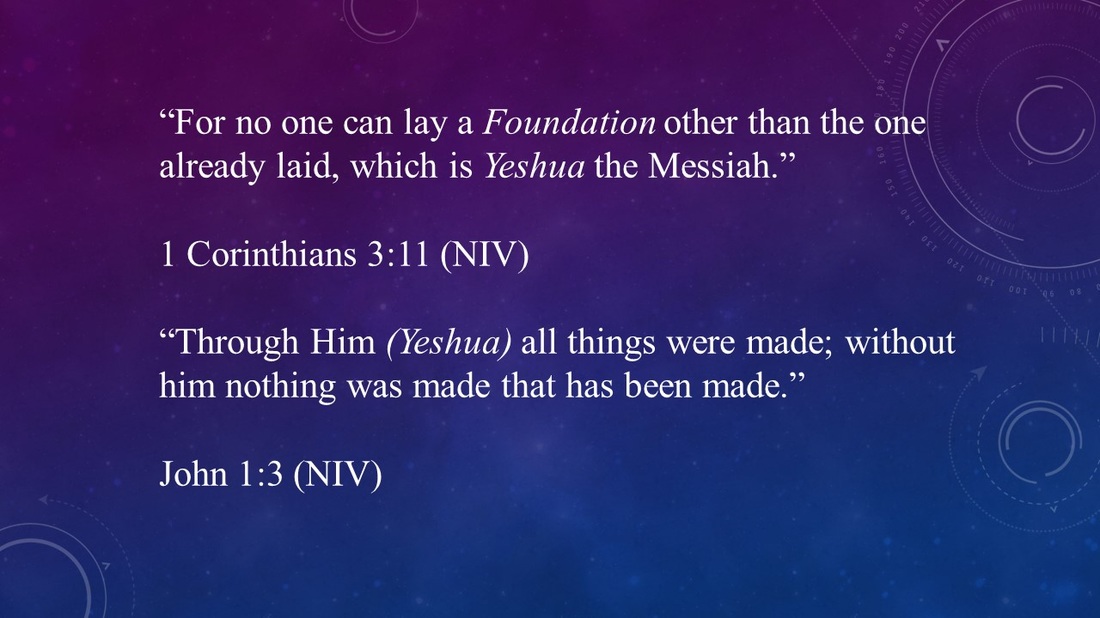
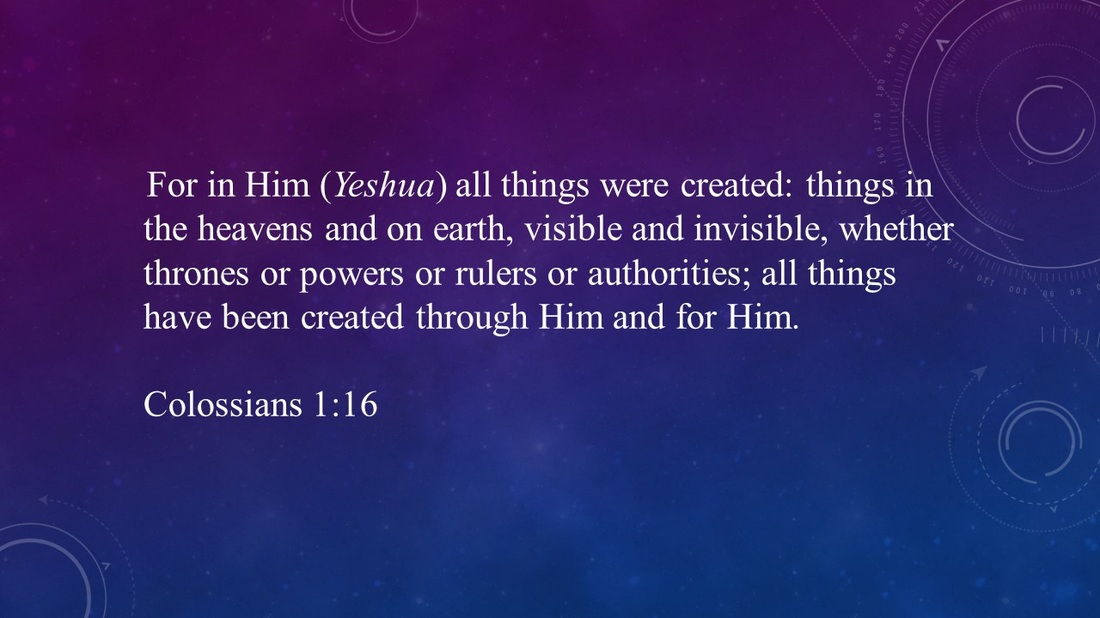


 RSS Feed
RSS Feed